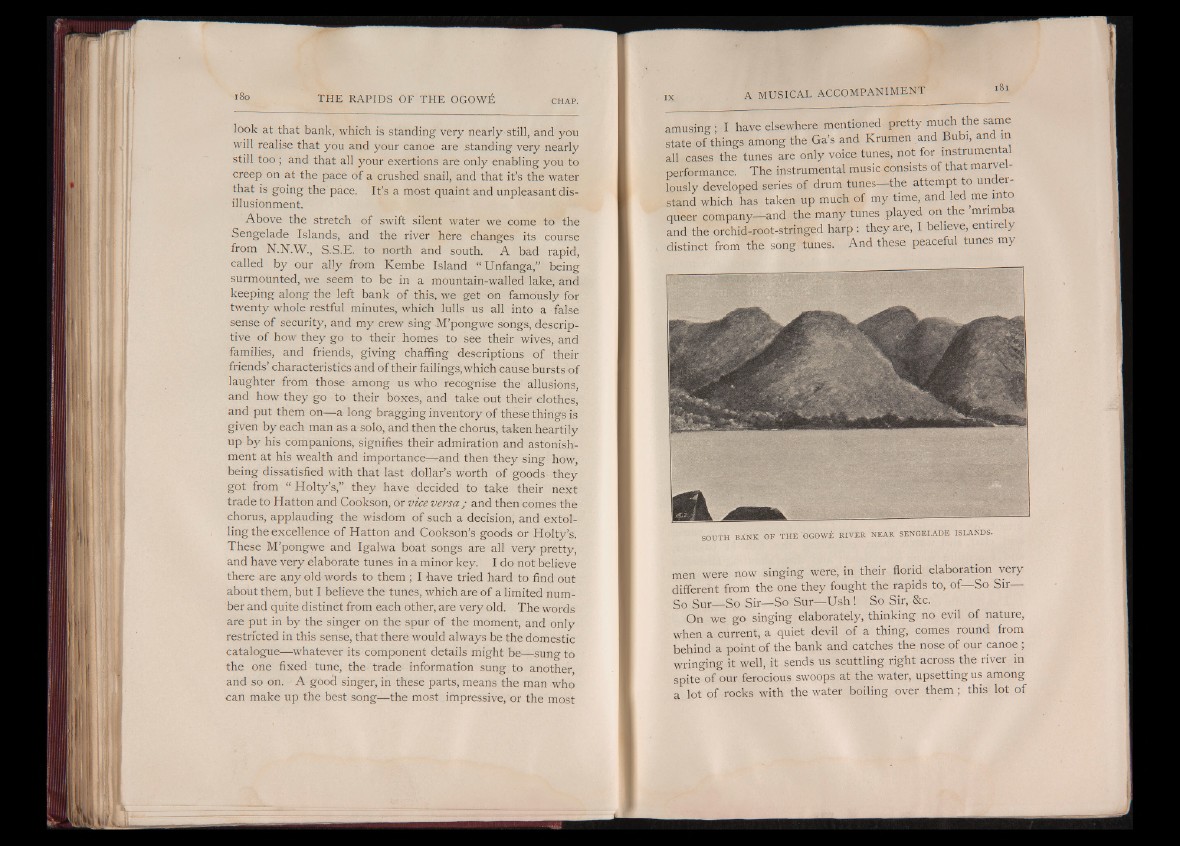
look at that bank, which is standing very nearly still, and you
will realise that you and your canoe are .standing very nearly
still to o ; and that all your exertions are only enabling you to
creep on at the pace of a crushed snail, and that it’s the water
that is going the pace. It’s a most quaint and unpleasant disillusionment.
Above the stretch of swift silent water we come to the
Sengelade Islands, and the river here changes its course
from N.N.W., S.S.E. to north and south. A bad rapid,
called by our ally from Kembe Island “ Unfanga,” being
surmounted, we seem to be in a mountain-walled lake, and
keeping along the left bank of this, we get on famously for
twenty whole restful minutes, which lulls us all into a false
sense of security, and my crew sing M’pongwe songs, descriptive
of how they go to their homes to see their wives, and
families, and friends, giving chaffing descriptions of their
friends’ characteristics and of their failings, which cause bursts of
laughter from those among us who recognise the allusions,
and how they go to their boxes, and take out their clothes,
and put them on— a long bragging inventory of these things is
given by each man as a solo, and then the chorus, taken heartily
up by his companions, signifies their admiration and astonishment
at his wealth and importance— and then they sing how,
being dissatisfied with that last dollar’s worth of goods they
got from “ Holty’s,” they have decided to take their next
trade to Hatton and Cookson, or vice versa ; and then comes the
chorus, applauding the wisdom of such a decision, and extolling
the excellence of Hatton and Cookson’s goods or Holty’s.
These M’pongwe and Igalwa boat songs are all very pretty,
and have very elaborate tunes in a minor key. I do not believe
there are any old words to them ; I have tried hard to find out
about them, but I believe the tunes, which are of a limited number
and quite distinct from each other, are very old. The words
are put in by the singer on the spur of the moment, and only
restricted in this sense, that there would always be the domestic
catalogue— whatever its component details might be— sung to
the one fixed tune, the trade information sung to another
and so on. A good singer, in these parts, means the man who
can make up the best song— the most impressive, or the most
amusing; I have elsewhere mentioned pretty much the same
state of things among the Ga’s and Krumen and Bubi, and in
all cases the tunes are only voice tunes, not for instrumental
performance. The instrumental music consists of that marvellously
developed series of drum tunes— the attempt to undei-
stand which has taken up much of my time, and led me into
queer company— and the many tunes played on the ’mrimba
and the orchid-root-stringed harp : they are, I believe, entire y
distinct from the song tunes. And these peaceful tunes my
S O U T H B A N K O F T H E O G O W E R I V E R N E A R S E N G E I . A D E I S L A N D S .
men were now singing were, in their florid elaboration very
different from the one they fought the rapids to, of— So Sir
So Sur— So Sir— So Sur— Ush ! So Sir, &c.
On we go singing elaborately, thinking no evil of nature,
when a current, a quiet devil of a thing, comes round from
behind a point of the bank and catches the nose of our canoe ,
wringing it well, it sends us scuttling right across the river in
spite of our ferocious swoops at the water, upsetting us among
a lot of rocks with the water boiling over them ; this lot of